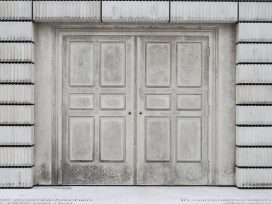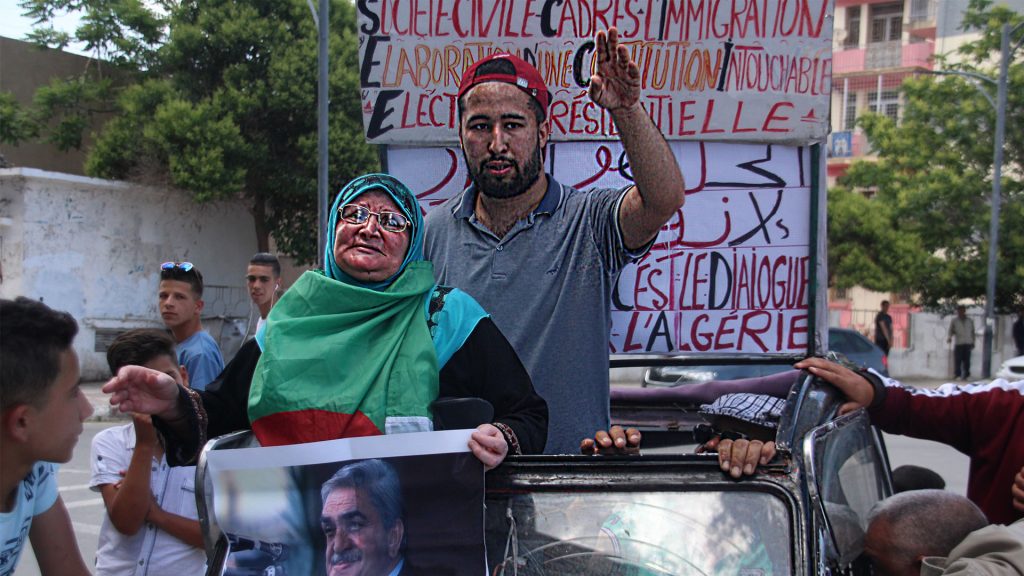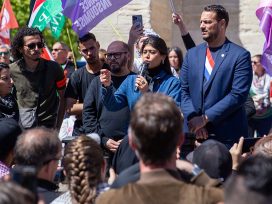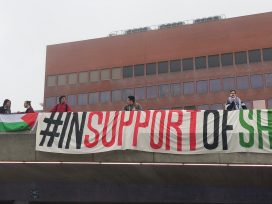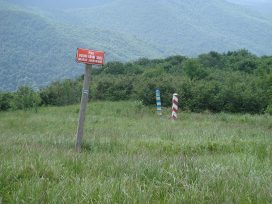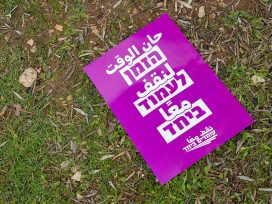The Hirak Movement in Algeria, which began on 22 February 2019, broke down the wall of fear in the country. Among the many for whom freedom of expression finally became possible were public sector journalists.
Before 1990, journalists’ powerless to criticise the regime had been partly responsible for the country’s stunted social-political development. When the democratization process began in 1990, the situation appeared to change. Journalists working in the private sector indeed made a major contribution. They were able to inform national and international opinion about what was standing in the way of progress in the country. Basic ideas about what constituted a democratic regime became widely known and supported by many Algerians. However, the role of journalists in the public sector remained limited to communicating the official view.
One of Algeria’s most important public media is Radio Algérienne (Entreprise nationale de Radiodiffusion sonore / National Sound Broadcasting Company). With its 56 channels, it is a de facto monopoly. This situation became most acute during the presidency of Abdelaziz Bouteflika (1999–2019), who once stated that the public media were the property of the state and that, if the opposition had something to say, it should do so through in the private press. After Bouteflika was forced out in February 2019, the public sector media was finally free to carry out its proper democratic role.
Institutional unfreedom
Dynamics within the media have a major impact on the content they produce. In the Algerian public media over the past decades, these dynamics have been particularly obstructive of journalists’ freedom to inform. Ever since independence, the state has been unwilling to make press freedom one of its priorities. Instead, the public media were turned into a mouthpiece for the authorities and a means through which they could diffuse their vision of Algerian life. With its 56 channels, the national broadcasting company Radio Algérienne has become a truly monopolistic structure.
The popular movement that began on 22 February 2019 revealed the discontent among public sector journalists about their lack of freedom and the despotic power wielded by editors. After Algerian radio failed to cover the first Hirak march, journalists for Radio Algérienne and Radio Algérie Internationale (RAI) organised a demonstration in the company’s headquarters. In a letter addressed to the organization’s Director General, they declared that:
We, journalists for national radio, channels I, II and III and RAI, hereby bear witness to the failure to respect neutrality in the reporting of information within our editorial departments. The hierarchy’s decision to make no mention of the major national demonstrations taking place on 22 February 2019 is illustrative of the blatantly hellish way that we have to carry out our duties, day after day.
Other protests also took place. The editor-in-chief of Channel III, Meriem Abdou, resigned in protest at the omertà imposed on reporting on the demonstrations against Bouteflika’s candidacy. Thirty years after Algeria adopted a multi-party system, treatment in the media of certain events by Algerian public media remained much the same as it had been during the days of the FLN.
This article is based on a study carried out between 2009 and 2016. In order to discover the views of journalists at Radio Algérienne who had freed themselves from the influence of the company’s bureaucratic routines, we sent out questionnaires to just over 200 journalists and received over 170 responses. We studied the three points in the questionnaire that seemed most crucial: coverage of routine events; interference by the authorities in the way that the information was presented; and self-censorship. We also held interviews with ten journalists and editors currently employed at Radio Algérienne as well as informal discussions with former employees.
Coverage of official events
Ever since independence in 1962, social life has been made up a cyclical recurrence of official government events. Radio Algérienne’s journalists are obliged to cover these, without having any freedom to discuss them. Just over 64% of respondents said that this routine had a negative emotional impact on them. Some were bored with covering official events and claimed that it caused their output to decrease, since intellectual effort was felt to be pointless. One of them described his state of mind as follows: ‘When I cover events of this kind, it depresses me, especially because they never involve anything new and they have no importance for listeners.’ Others consider this sort of task to inhibit their intellectual creativity. For some, the ‘routine’ leads to them feeling imprisoned in a professional relationship characterised by monotony, conformity and laziness.
Routine also has an impact on the informational content. Journalists say that, whatever the story they are covering, they use the same range of vocabulary. This makes what say less credible. They also approach the event from the same angle. They know in advance who will lead these events and, approximately, how they will unfold. Journalists often try to avoid being appointed to cover the event by their line manager. When they deal with this kind of institutional news, they reproduce a political discourse. They thus give visibility to power, speaking on its behalf and acting as a its double.
Just under a third of journalists said that they were not free to cover the events from an angle that they feel is beneficial for the public. They said that they were tired of dealing with events on a superficial level and would like to go further and to ask truly important questions in connection with them.
Editorial interference
Almost half of journalists had been told that what they were writing ran counter to editorial policy. Coverage of election results is a typical case in point. Journalist are induced to show reverence for the official view. Officials congratulate the journalist for his or her work when it conveys the right message – for example that it is not the government that is primarily to blame for the underdevelopment of the country, but rather the citizens. Subject matter that shows the opposite to be true, such as misappropriation of public funds, are avoided or simply announced with no real reportage or investigation.
This system of interference was in place prior to the multi-party system. In a study dating from the FLN period, 70.7% of journalists were found to have been subjected to interference by their superior, either regularly or occasionally, during an investigation into a critical problem. Journalists have in the past resisted to the power of their managers. In 1979, they asked that an editorial committee be set up as a joint consultative body. It was to express a view on any question relating to the organization of work and the way that the service functioned, with a view to improvements necessitated by the socialist revolution. The authorities responded by a 1982 law on information, which set up a ‘dialogue structure’ in each news organ ‘under the authority of the director’. In his research into the journalism of that period, Brahim Brahimi noted that ‘information is not shaped by the thousand or so journalists but by around ten directors appointed by decree’.
The sit-ins by journalists in 2019 at their headquarters in Algiers show that this situation still exists. After the failure by Algerian radio to cover the historic march on 22 February 2019, journalists went out shouting that they had had enough. ‘Down with repression, down with censorship and self-censorship! Public radio is a public service! Freedom of expression! Set words free! Censorship is death! Dignity for Journalists!’ These were some of the slogans at the sit-in.
The official way of thinking appears to want journalists who, in the words of the French journalist Bernard Poulet, ‘function in accordance with an algorithm that detects the wishes of the political system’. It permits no more than the smallest expression of citisens’ views and even then these will be carefully filtered. This situation has lowered trust in the quality of public service media and made it possible for social networks – Facebook in particular – to emerge as the reference media for the masses who fill the streets every Friday and demonstrate. This is extremely dangerous, since a free and democratic Algeria can only be achieved if, among other things, the neutrality of the public media’s treatment of the popular movement is guaranteed.
Self-censorship
Just over 58.1% of journalists said that they censored their own work frequently, 22.1% quite frequently and 12.8% rarely. Only 5.8 % said that self-censorship did not exist. One of the causes of is fear of reprisals and marginalization. The environment inside the organization inculcates self-censorship without the need for senior management to intervene. One journalist described it as follows:
To be faced with certain events or to hear about such events makes you try to anticipate before your boss draws your attention to it. In certain cases where the boss does give you a free hand or allows you time to reflect, it is still possible that later on there will be unfortunate consequences for you.
There are various ways in which marginalization can happen. Making a journalist take on a professional task that he or she does not want to accept is one such, according to one of the journalists:
Journalists can be marginalised by the bosses in one way or another. For example, they can be asked to cover an activity that they do not like or be made to carry out a professional task that they dislike. All journalists have their preferences; some prefer carrying out investigations but don’t like presenting the news broadcast. So the boss will, quite deliberately, give them the task of presenting the news.
After the first few years in their job, journalists come to realise that self-censorship is an unspoken rule. One journalist explained the situation as follows:
There are those who self-censure in order to get a post of special responsibility. Colleagues of this kind write things that they are not convinced about. Others do it to avoid reprisals. And then, there are certain colleagues who self-censure instinctively. They do it even when nothing compels them to do so.
Given that practice of self-censorship have been around at least since the time of the FLN, the mechanisms that reproduce it are clearly very durable. The practice causes the public to switch to foreign media in search of objective reporting, interesting content and cultural stimulus. Because of the effects of the judicial arsenal set up by the state to repress freedom, it is also a practice that has influenced the private press.
For a democratic public service media
If informing the public consists in providing information, such information must be correct. Otherwise it is not information; it is delusion, deceit, lies. If informing consists in giving form to facts, then the form must not distort the content. Otherwise the information is simply manipulation of the message and of the minds of those who receive it. It becomes propaganda.
In Algeria, state control of the production of news in public media is bureaucratic. Self-censorship, editorial interference and deadening routine make Radio Algérienne unfavourable to freedom of expression. This limits the intellectual participation of journalists in the production of content, minimises the role of public opinion on the news, and enables the official view of life in Algeria to gain influence in the public space.
The bureaucratic management of the collection, transformation and diffusion of mass information prevents this public medium from playing an active role in the democratisation of the political system and the promotion of social justice. It turns the media into a participant in the preservation of the political status quo. Persisting with such methods prevents journalists from lending their support to the popular movement that began on 22 February 2019 to change the system and establish democracy in Algeria.
